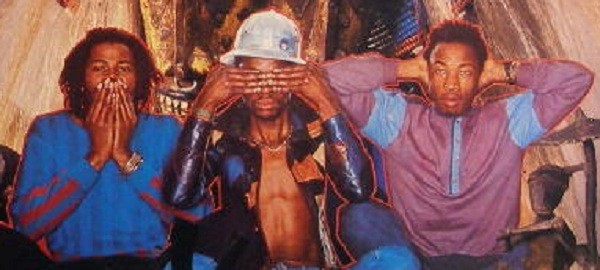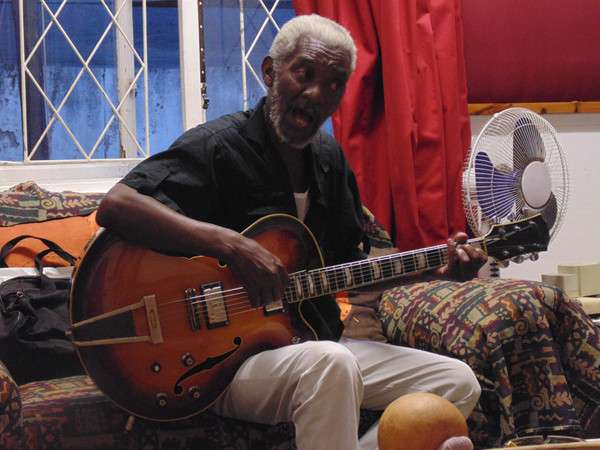
Malopoets
Band, ZA
World and R&B/Soul
South African group formed in 1978 by Patrick Sefolosha and Kenny Mathaba. A founding member MALOPOETS, Duze Mahlobo arranged, composed, and interpreted indigenous African musical influences, and was largely responsible for the trademark conceptual elements of style for which the band became famous. Often such original compositions and interpretations of indigenous and African urban popular performance traditions were considered too political by recording companies, music promoters and apartheid state security. The MALOPOETS line-up of 1979 consisted of Pat Sefolosha on percussion, vocals and saxophones; Bruce Sosibo on drums and vocals also guitarist, composer and arranger for the short-lived but influential MALOPOETS; Duze Mahlobo, lead guitar and vocals; Sam Tshabalala, guitar and vocals; Pat Mokoka, electric bass and vocals. Around 1978,1 was profoundly captured by MALOPOETS' music, imbued as it was with images of black resistance, indigenous religious symbols, poetry, and African spiritualism. Writing the liner notes for the band's ill-fated debut album entitled Rebirth-Malopoets, leader Patrick Sefolosha positioned the band's conceptual style firmly within South Africa's post-1976 ideological, social and cultural debates of African nationalism. The group searches in their music for an authentic, indigenous African sound. As the name suggests (MALOPO - Sothofor Spirits, POETS - interpreters of the spiritual language), they pledged themselves to the enunciation of the wisdom of the Spirits that are hovering over us all the time and of which we are consciously aware' (Pat Sefolosha 1979). The album itself juxtaposed images of indigenous African religion, especially in the tracks Exikwembu' (It's God); 'Call of the Spirits'; and Meropa Badimo' (Drums of the Spirits), with the ritual symbolism of birth, rites of passage, African solidarity, celebration and the affirmation of individual and social African identity. The themes alluded to by the texts of songs from this album, with titles such as 'Bamakweru' (Brothers and Sisters); 'Me M'Afrika' (I The African); Regomotse' (We're Silent, We're Not Speaking); 'Thabi' (Happiness, 9 Marriage); and 'Maboko' (Celebration), resonated with the experiences of the emergent African political and cultural consciousness in South Africa. It is undoubtably the contentiousness of such issues during South Africa's apartheid era, which led to the 'disappearance' of the master tapes of the album before it was commercially released. In Appendix II is included a brief example [Excerpt 1.1] of the song 'Me M'Afrika' (I The African), as it was performed live by MALOPOETS in a concert at the University of Zululand in the middle of 1979. It was the band's overt and radical African political leanings that ruled out most of the financially lucrative venues for MALOPOETS. The liberal university and college circuit was thus one of the ways in which they were able to popularise their music among a sympathetic, youthful and politically sensitized audience, '...at that time we couldn't play in white clubs, that's where we could have made the money. As far as I remember we only played at the beginning in one white venue in the yacht harbour... there was that fish and lobster restaurant... but then we had to apply to Pretoria for a special permit. That must have been around 1977, 1978' (Ellinor Hermann, MALOPOETS manager, Nov. 1997). MALOPOETS was a Durban-based performance group whose membership was made up of the ex-members of two township bands, AFPJKA and THIRD GENERATION. The former was from Mamelodi Township in Pretoria and was led by flautist while THIRD GENERATION were a KwaMashu band. MALOPOETS was more than a band in that their extended personnel included artists, poets and writers such as Eugene Skeef, Mafika Mbuli and the late Ben Langa. This aspect of MALOPOETS linked them strongly to the radical black literary world of Staffrider magazine, in which articles by MALOPOETS members appeared for some time in the first few years of the magazine's publication. The Malopoets - alongside Sipho Mabuse and Savuka - were, until their demise in 1986, one of the most significant and rewarding groups at the rootsier end of the township pop movement, playing a lighter, more relaxed form of mbaqanga. Sefolosha and Mathaba had served their apprenticeship in the rock and soul-orientated band Purple Haze before, alongside their audience, becoming increasingly frustrated in the mid-70s with imported styles and making a decision to strive for greater authenticity in their music. By 1983, however, the band were close to breaking up, finding it practically impossible to make a living under apartheid, where black bands were denied freedom to tour the country or promote their records on state radio. Sefolosha accordingly left South Africa and teamed up with producer Martin Meissonnier in Paris. A few months later the rest of the group joined him, signed to EMI Records and, in 1984, released the album, Malopoets. The set failed to make any impact on the burgeoning African music scene in Europe, however, being adjudged too pop-orientated by white audiences craving ‘roots’ sounds. It was followed by an appearance on the 1985 Tam Tam Pour L’Ethiope record and televised show, Africa’s indigenous response to Live Aid. Early the following year the Malopoets broke up.
Members
 | Thapelo Khomo key, p FR |
 | Bruce Sosibo voc, dr |
 | Pat Sefolosha voc, perc |
 | Kenny Mathaba eg, g |
 | Pat Mokoka eb, voc |
 | Duze Mahlobo voc |
Discography
| Title | Artist | Year | Type |
|---|---|---|---|
| The End Is Near | Malopoets | 1989 | Single |
| Life Is For Living | Malopoets | 1988 | Album |
| Life Is For Living | Malopoets | 1988 | Single |
| Sound Of The People / Sanibonani | Malopoets | 1985 | Single |
| Malopoets | Malopoets | 1985 | Album |
| Sound Of The People | Malopoets | 1985 | Album |
| Fire | Malopoets | 1982 | Album |
